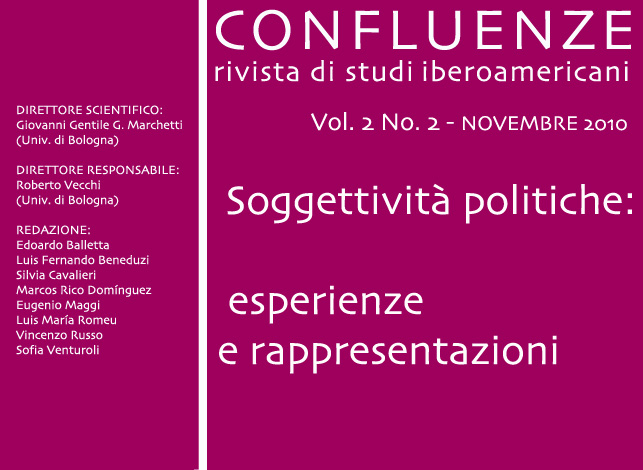Aprender la historia de Cuba: los recuerdos de un esclavo centenario
DOI:
https://doi.org/10.6092/issn.2036-0967/2005Resumen
Miguel Barnet's Biografía de un cimarrón is a paradigmatic example of mediate testimonial discourse aiming to rescue the voice of the oppressed and to be the conscience of a new cultural identity supported by the voice of Esteban Montejo. If on one hand testimony helps establish a memory that can not be consoled with the ambiguities of novelistic fiction, on the other, Barnet 'the manager' organized a narrative that aligns the past to present. Education on slavery, the story and its subjective nature have to structure a social identity which in turn is enclosed within a historical continuity that gives it a sense, that is a content and a direction. So the reader may be recognized in the "puesta en sentido" of the story of a life and of all that this story can offer to the reader: an autobiographical pact whose uniqueness lies in its performative character, intersubjective, in which the manager captures the reader. Keywords: Testimony-novel, slavery, autobiography, past-present, Revolutionary Cuba. Biografía de un cimarrón de Miguel Barnet es un paradigmático ejemplo de discurso testimonial mediato que quiere rescatar la voz del oprimido, ser conciencia de una nueva identidad cultural apoyada en la garantía de la voz de Esteban Montejo. Si por un lado su testimonio ayuda a establecer una memoria que no se consuela con las ambigüedades de la ficción novelística, por el otro el gestor Barnet organiza un relato que alinea el pasado al presente. Pedagogía sobre la esclavitud, el relato y su carácter subjetivo tienen que estructurar una identidad social que a su vez se inscriba en una continuidad histórica que le otorgue un sentido, o sea un contenido y una dirección. Así el lector podrá reconocerse en la “puesta en sentido” del cuento de una vida y de todo lo que ésta ofrece al lector: un pacto autobiográfico cuya peculiaridad radica en su carácter performativo, intersubjetivo, con el que el gestor captura al lector. Palabras claves: Novela-testimonio, esclavitud, autobiografía, pasado-presente, Cuba revolucionaria.Descargas
Cómo citar
Fiorani, F. (2010). Aprender la historia de Cuba: los recuerdos de un esclavo centenario. Confluenze. Rivista Di Studi Iberoamericani, 2(2), 189–201. https://doi.org/10.6092/issn.2036-0967/2005
Número
Sección
DOSSIER
Licencia
Derechos de autor 2010 Flavio Fiorani
Los derechos de autor y publicación de todos los textos de esta revista pertenecen a sus respectivos autores sin restricciones.
Esta obra está bajo una licencia de Creative Commons Reconocimiento 4.0 Internacional (código legal completo).
Véase también nuestra Open Access Policy.
Metadatos
Todos los metadatos del material publicado son de dominio público y pueden ser utilizados por cualquier persona de forma gratuita. Esto incluye las referencias.
Los metadatos -incluidas las referencias- pueden reutilizarse en cualquier medio sin autorización previa, tanto con fines lucrativos como no lucrativos. Rogamos a los usuarios que faciliten un enlace al registro de metadatos original.






